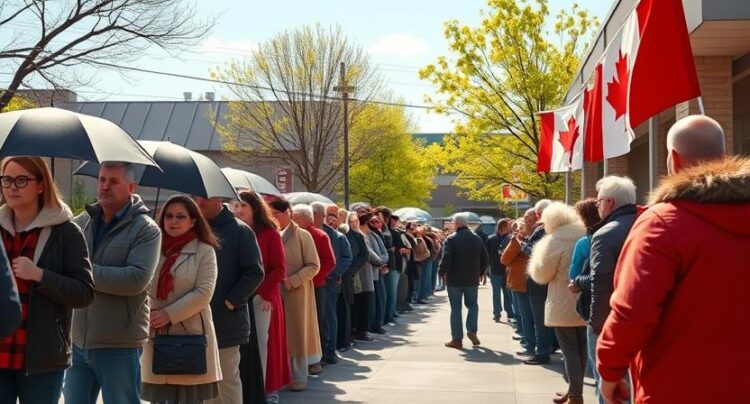An unprecedented 7.3 million Canadians cast their ballots during advance polls over the long weekend, marking a historic high for early voting, according to preliminary figures released by Elections Canada. This represents a dramatic 25 percent increase compared to the 5.8 million who voted early in the 2021 federal election.
Elections Canada thanked voters for their patience and election workers for their dedication, noting that despite long lineups at polling stations across the country, the advance polls were a major success.
Table of Contents
How the Advance Polls Played Out Across Canada
Advance voting stations were open from Friday to Monday, covering the long holiday weekend. The first day alone set another record, with over two million Canadians casting ballots in a single day.
Long lines were reported in multiple provinces, with some voters saying they waited several hours to cast their ballots. Despite the delays, the strong turnout was widely seen as a positive sign of democratic engagement.
James Hale of Elections Canada commented that a combination of factors, including voter convenience, campaign energy, and the popularity of advance voting, contributed to the surge.
Does Record Advance Voting Signal Higher Overall Turnout?
While the numbers are impressive, political experts urge caution in interpreting what they mean for overall election turnout.
Laura Stephenson, chair of the political science department at Western University, pointed out that a similar pattern occurred in the 2021 federal election. More Canadians voted early than in previous years, yet overall turnout actually declined—falling from 67 percent in 2019 to 62 percent in 2021.
“We cannot yet say for certain that this advance voting surge will translate into higher total voter turnout,” Stephenson said, emphasizing that the early enthusiasm might not necessarily extend to Election Day itself.
Understanding the Numbers: How Many Canadians Are Registered?
As of the beginning of the campaign, 28.2 million Canadians were registered to vote, an increase from 27.5 million registered voters in 2021. However, Elections Canada notes that registration is ongoing, meaning the final number of eligible voters will likely be even higher by Election Day.
Given these figures, it is not yet clear what percentage of the total electorate has already voted. That said, the sheer volume of advance ballots suggests that early voting is becoming a norm for many Canadians.
Liberal and Conservative Immigration Plans Compared Ahead of 2025 Election
Why Canadians Are Choosing to Vote Early
Several factors seem to be driving the increased popularity of advance voting:
- Convenience: Advance polls provide flexibility for those who might be busy or traveling on Election Day.
- Normalization: More Canadians now expect advance voting as a standard option during elections.
- Campaign Strategies: Political parties increasingly encourage early voting to lock in support ahead of any late-breaking controversies.
Stephenson also noted that early voting can protect voters’ choices from any negative developments late in a campaign. “If a major scandal were to erupt close to Election Day, voters who cast advance ballots would already have made their choice,” she said.
Importantly, she added, advance voting typically does not benefit any one party over another. Instead, it simply ensures that more votes are locked in earlier.
Special Ballots Also See Uptick
In addition to the surge at advance polls, thousands of Canadians have also voted using special ballots, which include mail-in voting and ballots cast at local Elections Canada offices.
This multi-channel voting approach reflects growing trends in accessibility and voter engagement, helping more Canadians participate in the democratic process.
What the Record Advance Voting Tells Us About 2025
While it remains to be seen how these early voting numbers will affect final turnout, the record-setting figures demonstrate a clear trend: Canadians are increasingly embracing advance voting as a convenient and reliable way to cast their ballots.
As the country moves closer to Election Day, all eyes will be on whether this early enthusiasm translates into higher overall participation or simply reflects a shifting pattern in when Canadians choose to vote.
Regardless of the final turnout, the 2025 federal election is already making history—and Canadians are clearly ready to make their voices heard.

